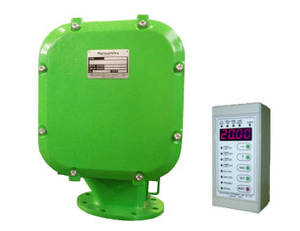Level Meter
Showing all 7 results
- Level Meter, Measuring Instruments, Testing Instrument & Equipment

Float Type Level Indicator Fig.6000 – SEMCO LTD.
Level Meter, Measuring Instruments, Testing Instrument & EquipmentFloat Type Level Indicator Fig.6000 – SEMCO LTD.
This is the definitive edition of float type level indicators for level gauging and monitoring.
It is an environmentally friendly product that does not require electricity, compressed air, or other power .
SKU: n/a - Level Meter, Measuring Instruments, Testing Instrument & Equipment

Level Meter SOUNDING M’s – Matsushima Measure Tech Co. Ltd.
Level Meter, Measuring Instruments, Testing Instrument & EquipmentLevel Meter SOUNDING M’s – Matsushima Measure Tech Co. Ltd.
Sounding M’s as a general-purpose sounding level meter provides stable measurement with reasonable price.
Standard Type Level Meter
Measuring range 0 to 40m
Accuracy 1%
Output signal 4~20mA DCSKU: n/a - Level Meter, Measuring Instruments, Testing Instrument & Equipment

Testing Instrument & Equipment Automatic Industrial Oil Oxidation – Iwasaki System Corporation
Level Meter, Measuring Instruments, Testing Instrument & EquipmentTesting Instrument & Equipment Automatic Industrial Oil Oxidation – Iwasaki System Corporation
Developing new products with originality, ingenuity and enthusiasm
Equipment to realize the oxidation reaction status of oil at each of the 6 stations
SKU: n/a
Are you looking for a Level Meter product?
When selecting Level Meter for your company’s needs, there are several important points to consider during the comparison and evaluation process.
1. Measurement Range and Accuracy
Check the measurement range and accuracy of the level meter to ensure it can handle the specific liquid or material you need to measure with precision.
2. Type of Level Measurement
Determine the type of level measurement needed, such as continuous level measurement, point level detection, or interface level measurement.
3. Installation and Mounting
Consider the ease of installation and mounting options suitable for your manufacturing setup, such as flange, thread, or non-intrusive methods.
4. Output and Communication
Check the output signals (e.g., analog, digital) and communication protocols supported by the level meter for integration with your control systems.
5. Environmental Compatibility
Evaluate if the level meter is designed to withstand the environmental conditions in your manufacturing facility, such as temperature, pressure, or hazardous environments.
6. Maintenance and Calibration
Assess the maintenance requirements and ease of calibration to ensure consistent and reliable performance over time.
7. Level Meter Material
Consider the material of the level meter, especially for applications with corrosive or aggressive liquids.
8. Display and User Interface
Check the display type and user interface for easy monitoring and configuration.
9. Power Supply
Ensure the level meter’s power supply requirements are compatible with your facility’s power sources.
10. Safety and Certifications
Verify if the level meter complies with relevant safety standards and certifications required for your industry.



